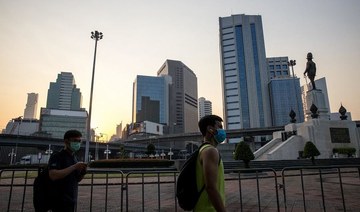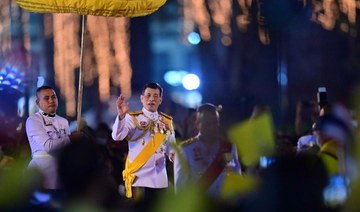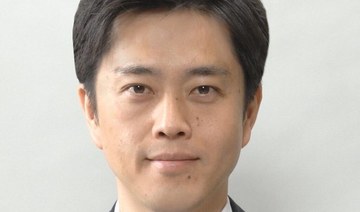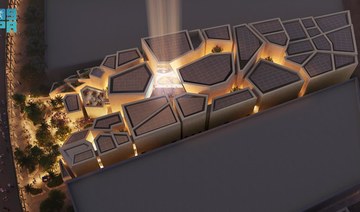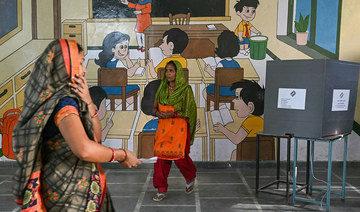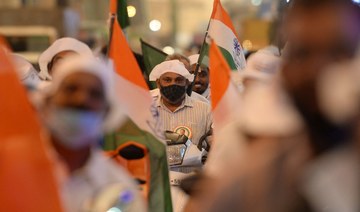BANGKOK: Police raided a Thai publishing house on Saturday and confiscated a controversial book written by a prominent pro-democracy leader about the monarchy’s role in society, ahead of a planned anti-government protest.
The protest is scheduled for 6 p.m. in front of the Grand Palace, where organizers planned to distribute copies of “The Institution of Monarchy in Thailand’s Society.”
Published by Same Sky Books publishing house – which has printed many controversial titles – the 33-page pamphlet is authored by human rights lawyer Anon Numpa.
He is one of the most prominent faces of Thailand’s pro-democracy movement, which has for months issued demands that include reforms to the kingdom’s unassailable monarchy.
Police Major Trirong Prasopmongkol confirmed that authorities raided the publishing house’s premises just north of the capital on Saturday morning, adding that they confiscated approximately “100 books.”
“The next step is we will have experts examine the content to see whether if it is illegal,” he told AFP.
“This raid is related to the protest today because protesters said on social media that they will distribute these books.”
Protest organizers Redem – short for “Restart Democracy” – had announced on Facebook that the first 10,000 arrivals would receive a free copy.
After the raid, Redem issued another post with the book’s e-copy, inviting demonstrators to download it and “read it out loud.”
Thailand’s pro-democracy protests kicked off in July, at their peak drawing tens of thousands, who gathered across Bangkok to call for an overhaul of Premier Prayut Chan-O-Cha’s administration and a rewrite of a military-scripted constitution.
But their most controversial demands – first publicly raised by Anon – have been for reforms to the monarchy, including the abolition of draconian royal defamation laws.
The laws shield the ultra-powerful King Maha Vajiralongkorn and his family from defamation, but rights groups say its broad use means anything perceived as criticism can land a person in jail for up to 15 years per charge.
Since the movement kicked off, more than 60 people have been charged under the lese majeste law, and a handful of the most prominent leaders – including Anon – are also detained.
The movement has slowed in recent months, drawing just hundreds, but local media reported that 3,000 crowd control police would be deployed for Saturday’s rally.
Thai police raid printing house over book by pro-democracy leader
https://arab.news/4k2p3
Thai police raid printing house over book by pro-democracy leader
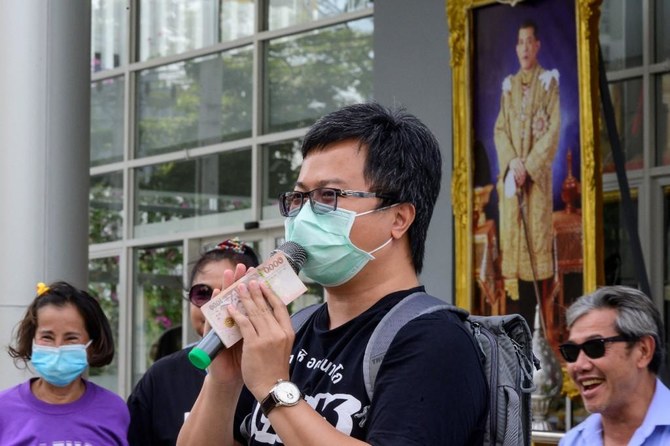
- Anon Nompa is one of the most prominent faces of Thailand’s pro-democracy movement
- The movement has slowed in recent months, drawing just hundreds
Jewish campaign group led by Gideon Falter cancels London march over safety concerns

- The Campaign Against Antisemitism says safety concerns forced it to call off its “Walk Together” march after receiving threats from ‘hostile actors’
- Last weekend, a video appeared to show police prevent ‘openly Jewish’ Falter from walking near a pro-Palestine protest but a longer version of the footage painted a different picture
LONDON: The organizers of a march in protest against antisemitism, planned for Saturday in London, “reluctantly” announced on Friday that they were canceling the demonstration.
The Campaign Against Antisemitism said it was forced by safety concerns to call off its “Walk Together” march, which was scheduled to coincide with the latest in a series of pro-Palestine marches in the British capital. The organization said it had expected thousands of people to take part but threats from “hostile actors” posed a safety risk.
“We have received numerous threats and our monitoring has identified hostile actors who seem to have intended to come to any meeting locations that we announced,” the CAA said.
“The risk to the safety of those who wished to walk openly as Jews in London tomorrow as part of this initiative has therefore become too great.
“We are no less angry about these marches than our Jewish community and its allies. We want to walk.”
The group added that it wants the Metropolitan Police not only to “manage marches” but “police” them.
Last weekend, a video that circulated on social media sparked controversy as it showed a confrontation between the CAA’s chief executive, Gideon Falter, and a Metropolitan Police officer who appeared to be preventing him from crossing the road in the vicinity of a pro-Palestine march in London because he was “openly Jewish” and his presence was “antagonizing.”
Falter, who was threatened with arrest if he did not leave the area, criticized the police for their actions during the incident and claimed there were now “no-go zones for Jews” in London amid a rise in antisemitic sentiment arising from Israel’s war on Gaza following the Oct. 7 attacks by Hamas.
Police chiefs apologized twice for the officer’s choice of words. However, a former senior police officer said on Monday that the initial, short version of the video most people saw online “did not fully represent the situation.”
A longer version showed the officer expressing concern about Falter’s actions because he appeared to be deliberately attempting to provoke the pro-Palestinian demonstrators.
Berlin police clear pro-Palestinian camp from parliament lawn

- Police dismantled tents, forcibly removed protesters and blocked the surrounding area to stop others arriving
- "The idea was to draw attention to that and ... to the German complicity and active enabling of the Israeli genocide in Gaza," the camp organizer, Jara Nassar, said
BERLIN: Berlin police on Friday began clearing a pro-Palestinian camp set up in front of the German parliament by activists demanding the government stop arms exports to Israel and end what they say is the criminalization of the Palestinian solidarity movement.
Police dismantled tents, forcibly removed protesters and blocked the surrounding area to stop others arriving.
The action followed clashes between demonstrators and police on US campuses and a blockade at Paris’s Sciences Po university, part of international protests to decry Israel’s military campaign in Gaza and Western support for Israel.
The Berlin camp ‘Besetzung Gegen Besatzung’ — ‘Occupy Against Occupation’ — began on April 8, coinciding with the start of International Court of Justice hearings in Nicaragua’s case against Germany for providing military aid to Israel.
“The idea was to draw attention to that and ... to the German complicity and active enabling of the Israeli genocide in Gaza,” the camp organizer, Jara Nassar, told Reuters.
Israel strongly denies accusations that its offensive in Gaza, which aims to destroy the Palestinian militant group Hamas, constitutes a genocide.
Nassar and a dozen protesters sat on the ground, chanting pro-Palestinian slogans and songs as police with loudspeakers called on them to leave.
“We look at what is happening in the US ... with admiration. There is no reason to believe we should stop now,” said Udi Raz, a PhD student at Berlin’s Free University and a member of the Jewish Voice association.
Raz, who wore a Jewish kippah with the Palestinian flag colors and held his phone in a live social media broadcast of the clearance, said Jewish activists had joined the camp and held a candle-lit Passover dinner there this week.
Police said the prohibition order for the camp, which had been granted authorization at the start of the protest, was due to repeated violations committed by some protesters, including the use of unconstitutional symbols and forbidden slogans.
“Protection of gatherings cannot be guaranteed at this point because public safety and order are significantly at risk,” police spokesperson Anja Dierschkesaid said, adding tents had to be moved daily under local regulations to maintain the lawn.
“For the German government, grass matters more than the lives of more than 40,000 innocent people in Gaza murdered by the Israeli military,” Raz said.
Philippine police kill an Abu Sayyaf militant implicated in 15 beheadings and other atrocities
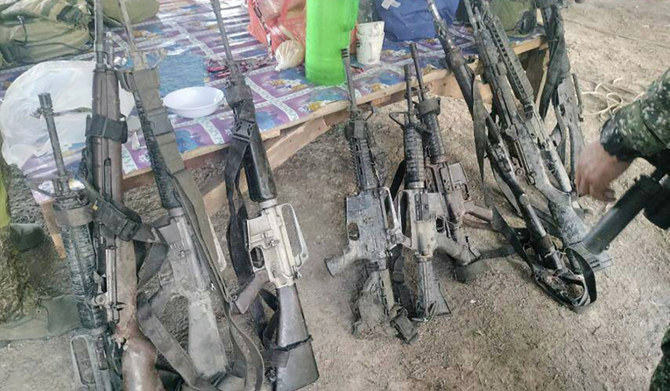
- A confidential police report said that Abdulsaid had been implicated in at least 15 beheadings in Basilan, including of 10 Philippine marines in Al-Barka town in 2007 and two of six kidnapped Vietnamese sailors near Sumisip town in 2016
MANILA: Philippine forces killed an Abu Sayyaf militant, who had been implicated in past beheadings, including of 10 Filipino marines and two kidnapped Vietnamese, in a clash in the south, police officials said Friday.
Philippine police, backed by military intelligence agents, killed Nawapi Abdulsaid in a brief gunbattle Wednesday night in the remote coastal town of Hadji Mohammad Ajul on Basilan island after weeks of surveillance, security officials said.
Abu Sayyaf is a small but violent armed Muslim group, which has been blacklisted by the US and the Philippines as a terrorist organization for ransom kidnappings, beheadings, bombings and other bloody attacks. It has been considerably weakened by battle setbacks, surrenders and infighting, but remains a security threat particularly in the southern Philippines, home to minority Muslims in the predominantly Roman Catholic nation.
Abdulsaid, who used the nom de guerre Khatan, was one of several Abu Sayyaf militants who aligned themselves with the Daesh group.
A confidential police report said that Abdulsaid had been implicated in at least 15 beheadings in Basilan, including of 10 Philippine marines in Al-Barka town in 2007 and two of six kidnapped Vietnamese sailors near Sumisip town in 2016. The Vietnamese were seized from a passing cargo ship.
He was also involved in attacks against government forces in 2022 and a bombing in November that killed two pro-government militiamen and wounded two others in Basilan, the report said.
Abdulsaid was placed under surveillance in February, but police forces couldn’t immediately move to make a arrest because of the “hostile nature” of the area where he was eventually gunned down, according to the report.
On Monday, Philippine troops killed the leader of another Muslim rebel group and 11 of his men blamed for past bombings and extortion in a separate clash in a marshy hinterland in Datu Saudi Ampatuan town in southern Maguindanao del Sur province, the military said.
Seven soldiers were wounded in the clash with the members of the Bangsamoro Islamic Freedom Fighters.
The Abu Sayyaf and the Bangsamoro Islamic Freedom Fighters are among a few small armed groups still struggling to wage a separatist uprising in the southern Philippines.
The largest armed separatist group, the Moro Islamic Liberation Front, signed a 2014 peace pact with the government that eased decades of sporadic fighting.
Moro Islamic Liberation Front rebel commanders became parliamentarians and administrators of a five-province Muslim autonomous region in a transition arrangement after signing the peace deal. They are preparing for a regular election scheduled for next year.
Saudi Pavilion at Expo 2025 Osaka: A journey through Saudi Arabia’s transformation, Vision for Future
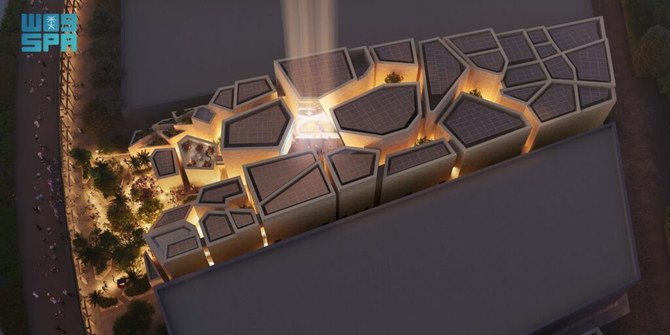
- Saudi chefs will present a mix of flavours inspired by different regions of the Kingdom
- More than 200 selections of souvenirs will be displayed in the gift shop, each a testament to authentic Saudi craftsmanship
OSAKA: The Saudi pavilion participating in Expo 2025 Osaka in Japan has announced an unprecedented cultural and artistic program encompassing more than 700 events to introduce visitors to Saudi Arabia’s rich heritage, mega projects and various economic opportunities.
The Saudi pavilion at the expo will present Saudi Arabia’s past, transformational journey and vision for a sustainable and prosperous future. It will include a wide range of performances, such as traditional arts, classical music and fashion shows.
Saudi chefs will present a mix of flavours inspired by different regions of the Kingdom, and Saudi musicians and artists will perform daily to highlight the Kingdom’s rich cultural heritage.
A dedicated area for prominent figures will host various sessions and display a series of presentations to inform companies and investors of all the economic opportunities available in the Kingdom.
More than 200 selections of souvenirs will be displayed in the gift shop, each a testament to authentic Saudi craftsmanship.
Visitors from around the world will learn about AlUla City, located in north-west Saudi Arabia, which is home to dramatic desert landscapes, spectacular rock formations and some of the Middle East’s most significant ancient sites.
Major Saudi projects will be highlighted, including NEOM, the land of the future; THE LINE, the 170-kilometer-long city that will be the future of urban living; Oxagon, which is redefining the traditional industrial model; and Trojena, the mountain resort of NEOM.
The pavilion will also showcase aspects of ‘Green Riyadh,’ a revolutionary project that aims to transform Saudi Arabia’s capital into a green oasis by planting 7.5 million trees by 2030. This project aims to place Riyadh as one of the world’s top 100 most livable cities.
It will also highlight the Reefscape Restoration Initiative, launched by the King Abdullah University of Science and Technology (KAUST). This initiative seeks to conserve, enhance, and restore 100 hectares of coral reefscape in the Red Sea and design and build the world’s largest Coral Nursery at Jeddah beach, with an expected coral production of 400k per year.
General Commissioner of the Saudi Pavilion Othman Al-Mazyad said: “We look forward to enabling visitors of the Saudi pavilion to learn about the Kingdom, its traditions, journey of transformation and vision for a sustainable future.”
Relations between Saudi Arabia and Japan have been continuously growing, thanks to the Saudi-Japanese Vision 2030. The Saudi Pavilion at Expo 2025 Osaka will allow companies and investors from Japan and worldwide to learn about the Kingdom’s various opportunities, aiming to forge new partnerships and expand existing agreements.
India’s mammoth election heats up in trend-defining second phase
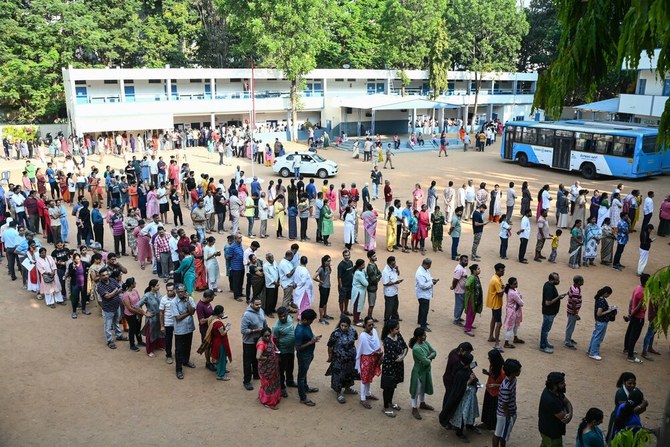
- Second phase is seen by analysts as defining dynamics of rest of the polls
- Turnout in first phase was lower than expected — 66 percent, compared with 70 percent in 2019
NEW DELHI: India’s mammoth general election rolled on Friday into its second phase, which is widely believed to likely set the trend for the rest of the polls.
More than 968 million voters were registered to cast the ballot vote in the world’s most populous country, where incumbent Prime Minister Narendra Modi and his Hindu nationalist Bharatiya Janata Party are eyeing a rare third straight five-year term in power.
The first phase of the vote was on April 19 as polling takes place over six weeks, with results expected on June 4. The other voting dates will be May 7, May 13, May 20, May 25 and June 1.
India has a total of 28 states and eight federally governed territories. Some regions complete the process on a single day, and others spread it out over several phases.
Voting last week took place in 21 states and union territories, with nearly 169 million people eligible to cast their ballots. In the second phase, more than 160 million people were expected to vote across 13 states and federal territories.
As many as 1,202 candidates contested the polls on Friday, vying for 88 of the 543 seats in the lower house of Parliament. In the previous phase, 102 seats were up for grabs.
More than half of the 88 seats were in the southern states of Kerala and Karnataka and the northwestern state of Rajasthan.
The party or coalition that wins at least 272 seats will form the government.
Modi, who ahead of the election was targeting 400 seats for his BJP-led National Democratic Alliance, is challenged by an alliance of two dozen opposition parties — the Indian National Developmental Inclusive Alliance, or INDIA, led by the Congress party, which has ruled the country for close to 45 years since independence in 1947.
‘MINI-GENERAL ELECTION’
The second phase of India’s polls is seen by analysts as defining the dynamics of the remaining five phases. One of the factors was the voter turnout, which in this election might be lower.
In the first phase, 66 percent of those eligible to vote cast their ballot — compared with 70 percent in 2019.
“From the first phase of the election, the message went that there is a silent undercurrent against the BJP and the dip in the voting percentage sent the signal that the BJP would slip in its strongholds in northern India particularly Uttar Pradesh,” Umakant Lakhera, political commentator in Delhi, told Arab News.
“If the trend of voters’ perceived apathy toward the election in general — and the BJP in particular — continues, then it’s an opportunity for the opposition Congress party to consolidate and mobilize its resources to widen its reach and capitalize on anti BJP sentiment.”
The key leader of the opposition coalition and Congress member is Rahul Gandhi, the son of Rajiv Gandhi, a grandson of Indira Gandhi, and a great-grandson of Jawaharlal Nehru, all of whom served as prime ministers of India.
Gandhi is seeking re-election from Wayanad in Kerala — the only major state that has never elected a BJP member of parliament, and where it was not a main competitor. This year, Modi’s party has been trying to make inroads into the state’s political scene.
The main contenders, besides Gandhi, are Annie Raja of the Communist Party of India and BJP’s K. Surendran.
“Kerala always has witnessed bipolar politics, but the BJP has been trying this time to make it a triangular contest, and this election will test whether a third force can find space in Kerala or not,” Prof. G. Gopa Kumar, political scientist and adviser to the Kerala-based Center for Public Policy Research, told Arab News.
“The second phase will test whether the stigma of the BJP of being an outsider in Kerala will continue or not, whether the stigma of not winning a seat in Kerala will continue or not.”
Far from Kerala, in the north, where several states were also going to the polls, another test was taking place at the same time — for the Congress party. Congress plunged to a historic low when it was swept out of power by the BJP in the 2014 general vote, and won its second-lowest number of 52 seats in 2019.
“The second phase is a mini-general election. What is at stake is whether the Congress is going to challenge the dominance of the BJP in the north Indian states like Uttar Pradesh, Rajasthan, Madhya Pradesh or not,” Kumar said.
“The contest is getting serious from now on. For the Congress, it is a survival question as they have to prove that they can defeat the BJP and survive as a big force.”
Although surveys suggest Modi will easily win a comfortable majority in parliament, his 400-seat target, often repeated ahead of the polls, has not been cited since last week’s first phase.
Asad Rizvi, an analyst based in Lucknow, the capital of India’s most populous state and BJP stronghold, Uttar Pradesh, said that the performance was apparently not as good as expected, despite the repetition of the party’s tactics of polarization along religious lines.
“A perception has come to dominate after the first phase of elections that the BJP has not performed well in its strongholds in Uttar Pradesh, therefore, the BJP will have a tough time mobilizing its core voters to retain the seats,” he told Arab News.
“The second phase is also crucial that will test whether the BJP’s communal agenda is working or not.”



